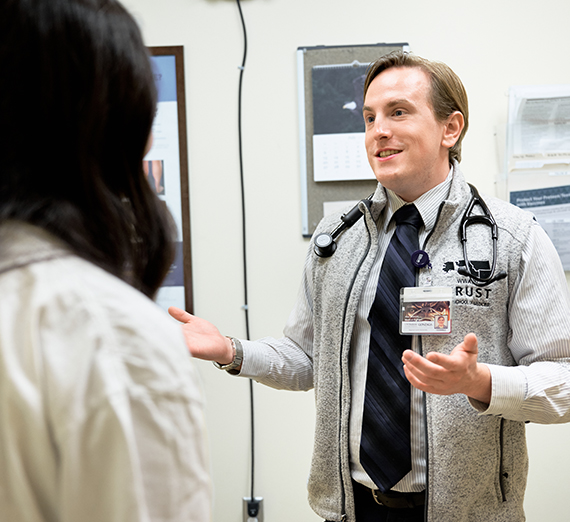Avista Foundation Grant Supports Rural Mental Health Research

Students from the University of Washington School of Medicine-Spokane research the effects of mental health on chronic illness and hospital stays
An estimated 36 percent of patients with a chronic illness also struggle with mental health issues. How does that impact hospital stays and overall health outcomes?
Thanks to a grant from the Avista Foundation, students from UWSOM-Spokane are researching the correlation at Coulee Medical Center in Grand Coulee, Washington.
Second-year student Alex Wilmoth worked on the project last summer as his Rural Underserved Opportunities Program (RUOP) project.
Wilmoth is on the Targeted Rural Underserved Track (TRUST), which trains University of Washington medical students for careers working in underserved rural communities and underserved small cities of the WWAMI (Washington, Wyoming, Alaska, Montana, Idaho) region. Wilmoth’s TRUST site is Grand Coulee where he will do all of his rural training during medical school. When not training in Coulee, Wilmoth, along with 59 other UWSOM-Spokane students, train with a growing number of students training for other medical and healthcare professions within the UW-GU Health Partnership.
"At Coulee Medical Center I charted reviews on inpatient stays," he said. "We're tracking mental health and social determinants of health to see how they affect the length of hospital stays."
As an undergrad, Wilmoth studied chemical engineering.
"I decided I wanted to work with people instead of spreadsheets, and pursued medicine," he recalled.
Growing up in the small town of Washougal, Washington, gave him an affinity for rural medicine."I want to help rural and underserved areas, and this research can have a lasting impact on these communities."
Third-year UWSOM-Spokane student Lydia Larson agreed.
She studied microbiology as an undergrad and worked as a bench researcher for seven years at UW. "That's when I got health insurance for the first time as an adult and decided to go to medical school."
Larson, also a TRUST student, has been working and studying in Grand Coulee through the WWAMI Rural Integrated Training Experience (WRITE) and is playing a pivotal part in the Avista-funded research.
"We're looking at several parameters regarding how mental health affects outcomes in rural areas, including length of hospital stay and complications for patients," she explained. "We're digging through charting notes, checking medications, access to care, and ER visits leading up to or following hospitalizations."
Recognizing the significant need for family medicine physicians and psychiatrists in rural communities, Larson plans to specialize in one of these two fields. She anticipates that this ongoing research project will benefit rural and underserved communities across the WWAMI region.
"My hope is the research will highlight the need for funding for mental health care in rural areas and attract more people to work in mental health care fields."
Wendy Hughes shares that hope.
Hughes, a family nurse practitioner and board-certified psychiatric-mental health nurse practitioner at Coulee Medical Center, is working with the students. "The research is really student-driven -- they're taking the lead," she said.
Her role has been helping the students at Grand Coulee translate the charting codes for the IT staff.
"Right now, they're at the point of selecting patients to do a deeper dive into their chart reviews," Hughes said. "The research will give us actual numbers for what we know in our hearts—if your mental health issues aren't under control, your physical health will be negatively impacted."
She's thankful that the grant from the Avista Foundation is allowing these students to conduct research that is poised to have a far-reaching influence.
"We wanted the grant to go toward the students to offset their time and energy," said Hughes. "Our communities will reap the benefits."
ABOUT THE UW-GU HEALTH PARTNERSHIP
The University of Washington School of Medicine and Gonzaga University formed a Health Partnership in 2016 with a vision to improve health and prosperity throughout eastern Washington by transforming medical education, research and innovation. The combined strengths of each institution – deep community roots and world-class health and medical education – and the vast network of students, faculty and health care professionals is creating an impact by preparing the next generation of health care professionals to advance discovery and develop new ways to care for patients. https://www.gonzaga.edu/academics/regional-health-partnership
ABOUT THE AVISTA FOUNDATION
Since its establishment in 2002, the Avista Foundation has made grants totaling over $17 million. The foundation focuses its giving in the areas of vulnerable and limited-income populations, education, and economic and cultural vitality. It is a separate, non-profit organization established by Avista Corp., and does not receive funding from Avista Utilities or AEL&P customers through rates. www.avistafoundation.com

